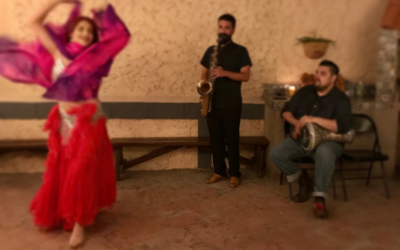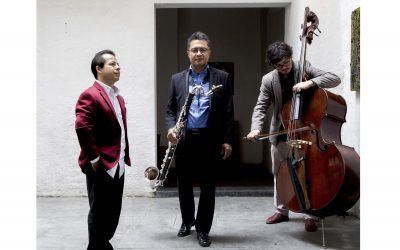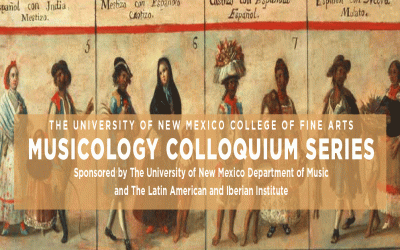On March 23rd and 24th, UNM Music Professors Kristina Jacobsen (Ethnomusicology; former President, Society for Ethnomusicology, Southwest Chapter) and David Bashwiner (Music Theory; outgoing President, Rocky Mountain Society for Music Theory) traveled with Musicology and Music Theory graduate students Regan Homeyer, Renata Yazzie and Matthew Stanley to present their original research at the regional Rocky Mountain Scholars’ Conference in Tucson, Arizona, hosted by the University of Arizona’s Department of Music. The very successful student papers given were:
Matthew Stanley (Music Theory), “Toward Metric Stability: The Interplay of Hemiola, Syncopation, and Meter in Brahms’ Violin Sonata No. 1 in G Major, Op. 78”
Regan Homeyer (Musicology), “Sounding the Nile: Hamza El Din as ‘Ethnographic Ear’”
Renata Yazzie (Musicology/Piano Performance), “Indigenizing Art Music: An Analysis of Connor Chee’s Navajo Vocables for Piano
Arab Musicking on the U.S.–Mexico Border
This talk explores the relationship between trauma and identity by examining Arab music performance on the U.S.–Mexico border. Drawing on the musicking of Syrian and Mexican migrant communities, I interrogate theories of cultural and psychological trauma and borderland epistemologies to explore how border tensions influence the often-fraught views of identity.
Music from the Americas presents The Low Frequency Trio
Formed by Antonio Rosales (bass clarinet), Juan José García (doublebass), and José Luis Hurtado (piano), LOW FREQUENCY TRIO is one of the few ensembles in the world that plays music that was exclusively composed for them.
Music, Power, and Signification: A Phenomenological Reading of Race in New Spain
In New Spain, an institutional structure of merit and promotion hinged on the idea of reason as an intrinsically European attribute. This attribute differentiated ‘Europeans’ from people of mixed race claiming European status based on their skin complexion.



